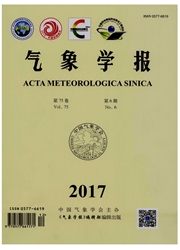

 中文摘要:
中文摘要:
利用高时间精度GPS同步的雷电快天线电场变化测量仪等设备,在2004年夏季对甘肃中川地区雷暴的闪电放电特征进行了7站同步观测。在此基础上,发展了一种基于到达时间差的快天线电场变化脉冲定位方法,对8月20日一次强雷暴过程的5次云闪初始阶段产生的快天线电场变化脉冲进行了三维定位分析。结果表明:基于辐射源到达不同测站的时间差,能够对云闪产生的辐射源进行较好的定位,闪电的放电区域与雷暴的不同发展阶段密切相关。在雷暴发展的比较旺盛阶段,闪电的放电区域相对较高,对应的离地高度为3.3—6.4 km(此时对应的雷达回波顶高约9 km,回波强度在35 dBz以上的回波顶高约7 km);在雷暴处于减弱和消散阶段,闪电的放电高度降低,所分析的该阶段的其中1个云闪对应的离地高度为1.1—3.0 km(此时对应的雷达回波顶高约6 km,回波强度在35 dBz以上的回波顶高约3 km)。与雷达回波的对比分析发现,云闪初始阶段的辐射脉冲源位置与强回波区具有较好的空间一致性,辐射脉冲源位置分别与25—50 dBz的回波区域相对应。这不仅在一定程度上表明了定位结果的可靠性,而且说明利用快天线电场变化测量仪组网观测对闪电进行定位跟踪有可能反映雷暴强中心的发展变化过程,同时也表明了利用快天线电场变化测量仪组网观测在强对流的监测和预警中有一定的应用潜力。另外,定位误差的模拟试验表明,当雷电距观测网络较近时,定位误差较小,雷电距观测网络中心越远,定位误差越大。5次云闪的实际定位误差对比表明,模拟试验的定位结果在很大程度上能够有效地反映实际定位误差。这说明了该定位系统对位于探测网络上空或附近的雷电可以进行云内放电过程的较好的三维定位。
 英文摘要:
英文摘要:
Multi-station observation on lightning flashes in the Chinese Inland Plateau area was conducted in the summer of 2004 by using fast electric file change, slow electric file change and field mill. The high time-resolution GPS (its absolute timing accuracy was 50 ns) was used to synchronize the signals from each station. Based on the data obtained from multi-station lightning observations, characteristics of the lightning activities in the thunderstorms and pulses in the lightning flashes were analyzed. By using the technique of differential time of arrival (DTOA), a lightning radiation location technique, based on the fast electric field changes, was developed. Radiation pulses in the initial stages of five intracloud (IC) lightning discharges which occurred on Aug 20, 2004 were located with the developed technique. The results indicate that the location technique could effectively locate the lightning radiation sources. The lightning sources were found to be nicely associated with the stoma activity. When the storm was at mature stage, with echo top of 9 km, the lightning .sources were located from 3.3 to 6.4 km above ground; when the storm gradually became weak, with echo top of 6 km, the lightning sources were located from 1.1 to 4.0 km. Especially, one of IC lightning discharges were located from 1.1 to 3.0 km during the weaken stage of the storm. Compared with the Doppler radar echo, the location of the radiation sources were found to be nicely associated with the high reflectively storm regional, and the echo intensity was between 25 dBz and 50 dBz. It is not only conformed the reliability of the location results to some extent but also showed that the fast electric filed change detection system can be used to monitor the overall storm development with the height and rate of the sources. In addition, the results and the location error were also analyzed with the Doppler radar data and the simulated location results. The results show that the location error is small when the radiation sources near
 同期刊论文项目
同期刊论文项目
 同项目期刊论文
同项目期刊论文
 Intracloud discharge and the correlated basic charge structure of a thunderstorm in Zhongchuan, a Ch
Intracloud discharge and the correlated basic charge structure of a thunderstorm in Zhongchuan, a Ch Influence of channel tortuosity on the lightning return stroke electromagnetic field in the time dom
Influence of channel tortuosity on the lightning return stroke electromagnetic field in the time dom 期刊信息
期刊信息
